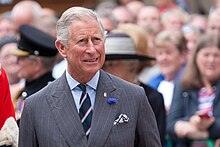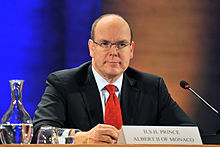Prince
Aprinceis amalemember of aroyal family.The female version of this title is called aprincess.Different countries have different rules based on who is a prince.
Types of princes[change|change source]
The title of "prince" is different depending on the country. Each royal family has its own rules saying who is called a prince.
Crown Prince[change|change source]

Acrown prince(female:crown princess) is theheir apparentof a country. This means that he is the person who will becomekingafter the current king dies.
Most of the time, the crown prince is the son of a king but can also be a close relative if the king has no children.
In some countries, such as theUnited KingdomandSpain,the crown prince is given their own unique title, such asPrince of WalesandPrince of Asturias.
In addition, the siblings of a crown prince can also be called princes or princesses, even though they are not the heir to the throne. The siblings often continue to be called "prince" and "princess" even after the crown prince becomes king.
For example,Princess Anne,Prince EdwardandPrince Andrewall have the title of prince even though their brother,Charleswas the crown prince (and now the king).
Prince Consort[change|change source]

Aprince consortis the title of the husband of aRuling Queenin many monarchies.
Unlike kings, whose wives are called queens, the husband of a ruling Queen is called a prince.
This is because historically, the title of "king" is seen as a higher rank than queen. Because the Queen Regnant is the monarch of her country, nobody can be given a "higher" title. For this reason, her husband is called a prince consort.
Some countries, however, do allow the husband of a queen to be titled "king consort". But this is very rare.
Sovereign Prince[change|change source]

Asovereign prince(also known as aruling prince,reigning princeorprince regnant) is the ruler of amonarchyknown as aprincipality.
This is mainly to do with size, because principalities were considered too small to become actualkingdoms,duchiesorempires.
The most famous principality isMonaco.This is because throughout Monaco's history, they were always allied with a country much larger and more powerful. For this reason, the rulers of Monaco did not call themselves kings and queens.
